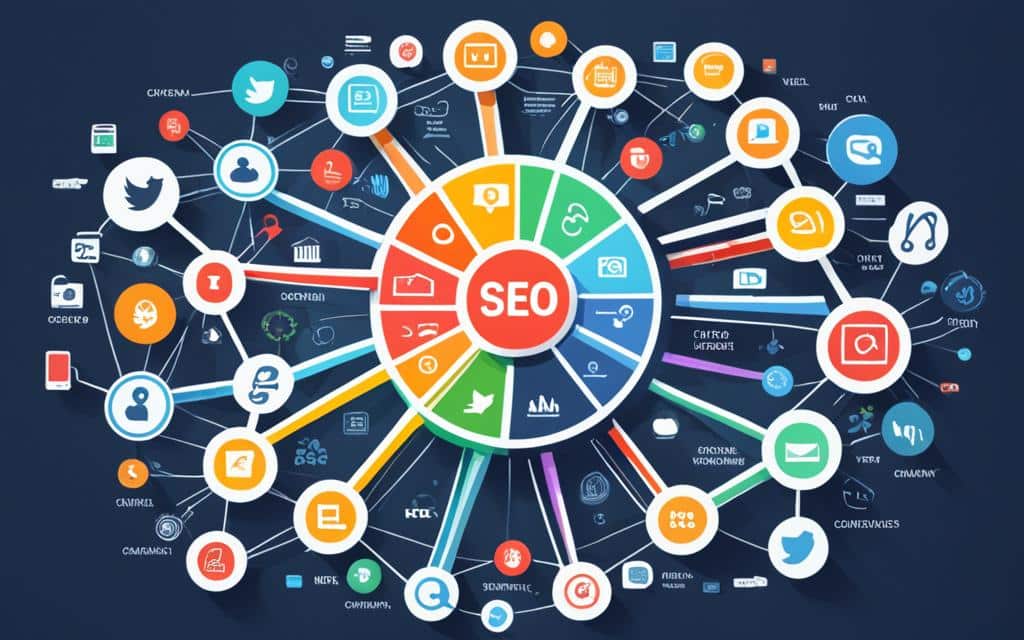Table of Contents
SEO marketing channels integration is essential in today’s digital landscape to maximize impact and achieve synergistic campaign results. SEO goes beyond improving website rankings and driving organic traffic; it plays a profound role in various marketing channels, working hand in hand with other strategies to create a powerful and cohesive marketing approach.
Before integrating SEO with other channels, it’s important to understand the fundamentals of SEO, including on-page optimization and technical SEO. By laying a solid foundation, businesses can leverage SEO to enhance their digital marketing efforts.
The most common marketing channels include digital advertising, content marketing, social media marketing, email marketing, influencer marketing, event marketing, print advertising, and television/radio advertising. SEO serves as the bedrock for these diverse marketing strategies, complementing content marketing, social media engagement, and paid advertising campaigns.
Integrating SEO effectively with other channels can lead to a seamless and synergistic campaign. It enhances the discoverability, visibility, and overall success of marketing initiatives, ensuring that businesses achieve their goals and continuously improve their strategies.
The Impact of SEO on Paid Advertising
Paid advertising, both digital and traditional, can be highly impacted by organic search. Achieving SERP domination by ranking prominently in both paid and organic results increases visibility and credibility. SEA and SEO can work together to achieve better performance by sharing data, knowledge, and insights.
“SEA can help predict SEO strategies and optimize metadata based on PPC campaign results.”
“SEO can enhance landing page relevance and quality for improved Quality Score.”
“Integrated bidding strategies and budget management can optimize both SEO and SEA.”
“Lastly, PPC can be used as a backup strategy when organic rankings fluctuate.”
To understand the impact of SEO on paid advertising, it is essential to delve into specific areas where SEO techniques can be leveraged to enhance paid advertising performance.
1. Metadata Optimization
Metadata optimization plays a crucial role in improving the visibility and click-through rates of paid advertisements. By using relevant keywords and compelling copy in meta titles and descriptions, advertisers can attract the attention of potential customers on the search engine results page (SERP). This not only increases the likelihood of ad clicks but also positively impacts the organic search presence.
2. Quality Score Enhancement
The Quality Score is an important metric used by search engines to evaluate the relevance and quality of landing pages in paid advertising campaigns. By optimizing landing pages for relevant keywords, providing valuable content, and ensuring a seamless user experience, advertisers can improve their Quality Score. SEO techniques such as on-page optimization, keyword research, and user-friendly design can contribute to higher Quality Scores, leading to improved ad rankings and reduced ad costs.
3. Bidding Strategy Optimization
An effective bidding strategy is crucial for maximizing the return on investment (ROI) of paid advertising campaigns. By integrating SEO and paid advertising efforts, advertisers can gain insights into the performance of specific keywords and use that data to optimize their bidding strategy. Analyzing organic search performance can provide valuable information on keyword trends, competition, and user intent, which can inform bidding decisions and lead to more efficient and cost-effective campaigns.
4. SEA and SEO Synergy
SEA and SEO can be mutually beneficial when used in tandem. By combining paid advertising data with SEO research, advertisers can gain a comprehensive understanding of their target audience’s search behavior and preferences. This knowledge can then be used to optimize both organic and paid content, targeting the right keywords, and delivering relevant messaging to drive conversion and business growth.
“SEO integration can contribute to SERP domination, enhancing the credibility and visibility of paid advertising campaigns.”
By leveraging the synergy between SEO and paid advertising, marketers can create a holistic digital marketing strategy that maximizes the impact of both channels, resulting in improved performance, increased brand visibility, and higher ROI.
| Benefits of SEO on Paid Advertising | SEO Techniques Contributing to Benefits |
|---|---|
| Increased visibility and credibility | Metadata optimization |
| Improved Quality Score | On-page optimization |
| Efficient budget management | SEO research |
| Synergy between organic and paid content | Keyword integration |
The Synergy Between SEO and Content Marketing
SEO and content marketing share a strong relationship that is essential for marketing success. The integration of SEO into content marketing strategies allows businesses to optimize their online presence and drive organic traffic. By understanding the principles of SEO research and keyword integration, marketers can create high-quality, SEO-friendly content that aligns with user intent and satisfies both users and search engines.
SEO research plays a pivotal role in content marketing by identifying highly searched topics. This valuable insight enables marketers to strategically integrate relevant keywords into their content, increasing its visibility in organic search results. By incorporating these keywords naturally and organically, businesses can enhance their chances of ranking higher, attracting more traffic and potential customers.
However, a successful content marketing strategy goes beyond keyword optimization. It should also focus on providing high-quality and valuable content that meets the needs and expectations of the target audience. By prioritizing user intent and delivering valuable information, businesses can establish themselves as authoritative sources in their industry.
Furthermore, SEO emphasizes the importance of creating SEO-friendly content that is easily readable and accessible to search engine algorithms. This involves proper formatting, the use of relevant headings and subheadings, and incorporating appropriate meta tags.
“High-quality, user-centric content that is optimized for search engines is a winning combination in content marketing.”
The synergy between SEO and content marketing goes beyond improving organic search visibility. It enhances content discoverability, increases visibility across various platforms, and drives engagement. By aligning SEO and content marketing strategies, businesses can maximize their marketing efforts and achieve their overall marketing objectives.
Benefits of SEO integration in content marketing
| Benefits | Description |
|---|---|
| Improved organic search visibility | By optimizing content with relevant keywords, businesses can increase their visibility in search engine results pages (SERPs). |
| Increased website traffic | SEO-friendly content attracts more targeted traffic, leading to potential conversions and business growth. |
| Enhanced credibility and authority | By providing valuable and authoritative content, businesses can establish themselves as industry experts. |
| Improved user experience | SEO-friendly content is well-structured, easy to navigate, and provides a positive user experience. |
| Optimized content distribution | SEO research helps identify the most effective channels for content distribution, maximizing its reach and impact. |
Overall, the integration of SEO and content marketing is crucial for businesses seeking to achieve online marketing success. By leveraging SEO research and creating high-quality, SEO-friendly content that aligns with user intent, businesses can enhance their visibility, credibility, and engagement, ultimately driving their marketing efforts to new heights.
The Power of SEO in Social Media Marketing
When it comes to social media marketing, content plays a pivotal role in enhancing business visibility and engaging with the target audience. By sharing valuable and relevant content, businesses can leverage social media platforms to build a strong online presence. However, optimizing this content for search engines is equally important to ensure maximum visibility and reach.
Social media marketing is all about establishing consistent branding across different platforms. A cohesive and recognizable brand image helps businesses stand out in the competitive social media landscape. Whether it’s the logo, color scheme, or messaging, maintaining consistent branding across all platforms is crucial for creating a strong brand identity.
Consistency is key in social media marketing. It helps businesses establish trust and credibility among their audience, leading to better engagement and conversions.
However, consistent branding alone is not enough. To truly optimize social media marketing efforts, data-driven insights are essential. Social media analytics provide valuable information about audience demographics, engagement metrics, and platform-specific trends. By leveraging these insights, businesses can identify the most effective topics, formats, and times for their social media content.
Creating SEO-friendly Content for Social Media
Creating content that caters to both social media platforms and search engines is a fine balancing act. By integrating key SEO tactics into their social media strategy, businesses can improve their online visibility and reach a wider audience. Here are a few important aspects to consider:
- Keyword Integration: Conducting proper keyword research and integration is crucial for optimizing social media content. By identifying relevant keywords, businesses can ensure their content aligns with user search queries and improves organic visibility.
- Content Distribution: Properly distributing SEO-optimized content across different social media platforms helps increase its reach and engagement. Each platform has its own unique features and algorithms, so adapting the content to suit each platform is key.
- Personalized Landing Pages: Businesses can make use of personalized landing pages to optimize their social media campaigns. By tailoring landing pages with relevant keywords and content based on user preferences, businesses can improve audience segmentation and increase conversion rates.
Integrating SEO with social media marketing allows businesses to maximize their online visibility, engage with their target audience effectively, and drive conversions.
Summary
In summary, understanding the power of SEO in social media marketing is crucial for businesses looking to make a lasting impact online. By maintaining consistent branding, leveraging social media analytics, and creating SEO-optimized content, businesses can amplify their social media presence and improve their overall marketing performance.
Conclusion
Integrating SEO with other digital marketing channels is crucial for maximizing impact and achieving marketing goals. It requires a deep understanding of the audience and goals, consistent messaging and branding, leveraging data and insights, constant testing and experimentation, and regular review and adjustment. By effectively integrating SEO with other channels, businesses can create a holistic and optimized marketing strategy.
To achieve success in the digital landscape, continuous improvement and adaptation to changing algorithms and trends are vital. SEO serves as a foundation for digital marketing, amplifying the effectiveness of other channels. By strategically optimizing websites and aligning content with user intent, businesses can enhance their online visibility and attract relevant organic traffic. This integration enables seamless coordination across different marketing initiatives.
Furthermore, optimizing strategy and continuously improving SEO efforts enable businesses to achieve their marketing goals. With the right approach, businesses can unlock opportunities for growth, generate targeted leads and conversions, and increase brand awareness. Embracing a data-driven mindset and staying on top of industry trends allow for agile decision-making and effective optimization.
In conclusion, integrating SEO with other digital marketing channels is a powerful strategy for achieving remarkable results. With a well-crafted and executed plan, businesses can harness the full potential of SEO to optimize their digital marketing efforts, drive organic traffic, and achieve lasting success in the ever-evolving digital landscape.
FAQ
How does integrating SEO with other marketing channels maximize impact?
Integrating SEO with other marketing channels allows businesses to create a holistic and optimized marketing strategy. This maximizes impact by leveraging the strengths of each channel and creating synergistic campaign results.
How does SEO impact paid advertising?
SEO has a significant impact on paid advertising, both digital and traditional. Achieving SERP domination by ranking prominently in both paid and organic results increases visibility and credibility. SEO and SEA can also work together to achieve better performance by sharing data, knowledge, and insights.
What is the synergy between SEO and content marketing?
SEO and content marketing share a strong relationship that is essential for marketing success. SEO influences keyword selection, topic research, and related searches, while content marketing focuses on creating high-quality and valuable content. The synergy between the two enhances content discoverability, visibility, and supports overall marketing objectives.
How does SEO impact social media marketing?
SEO plays a pivotal role in social media marketing by emphasizing consistent branding, data-driven insights, and content distribution. By sharing valuable and relevant content, businesses can enhance their social media presence and leverage social media platforms for targeted audience engagement.
What is the importance of integrating SEO with other marketing channels?
Integrating SEO with other marketing channels is essential for maximizing impact and achieving marketing goals. It requires a deep understanding of goals and audience, consistent messaging and branding, leveraging data and insights, constant testing and experimentation, and regular review and adjustment.













